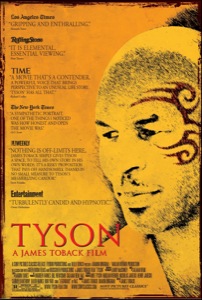
There's a case to be made that Mike Tyson ruined boxing for a generation of fans who came of age after Muhammad Ali.
For us, no fighter will equal the aura of '80s-era Tyson, who charismatically embodied the violence at the heart of the sport's appeal. But his extended crash and burn and degeneration into a tawdry sideshow makes it hard for us to take the sport seriously ever again.
Still, he remains an enduringly captivating character. And just as his name sold video games when we were kids, so it will sell tickets for James Toback's new documentary film, Tyson, which premiered in theaters last Friday.
The movie weaves old footage of Tyson with interviews with the contemporary version culled from more than 30 hours of tape. On display is the stark discrepancy between the menacing block of granite he once was and the tired, doughy middle-aged man he has become.
Some of the fury in Tyson's face is gone, but the sadness behind that fury is not. Neither, for that matter, is the restless, frustrated search for self that makes Tyson a somewhat sympathetic character despite his many misdeeds.
Tyson is often mocked for his speech impediment, his fondness for big words he has not quite mastered, and some of his more ridiculous statements through the years (threatening to eat Lenox Lewis' children before praising Allah comes to mind). But the man is not stupid, and his narration carries the movie.
He takes us back to his youth in "hellacious" Brownsville, Brooklyn of the 1970s, telling us that before he became a street thug, he was the target of neighborhood bullies because he lacked the confidence to stand up for himself. That all changed when a bully grabbed one of the pigeons Tyson kept for a pet and ripped the bird's head off. Tyson flew into the rage and beat the bully to a pulp. From that moment on, nobody fucked with him. He had discovered in himself a capacity for violence, but some three decades hence, he is still looking for much else.
The movie makes the viewer feel sorry for Tyson, but that doesn't override our repulsion with many of his actions. In the film, his poignant introspection often crosses over into self-absorption. He keeps his anger and destructiveness mostly under wraps, but can't prevent these qualities from occasionally leaping to the surface in disturbing ways.
He is still furious with Desiree Washington, the Miss Black America beauty pageant contestant whose accusations of rape led to his 1992 conviction and three-year prison sentence. He calls her a despicable liar and insists he never "took advantage of her," in his words, though he admits to taking advantage of other women, an example of one of his many blind-spots.
In the end, what emerges is a man of contradictions: The same man who charged at Lenox Lewis during a pre-fight press conference in 2002 tenderly wiped blood off his opponent's face after their bout.
He is contrite and angry, a victimizer and a victim. And after all these years, he is still enthralling.

Tyson premiered Friday, April 24th.